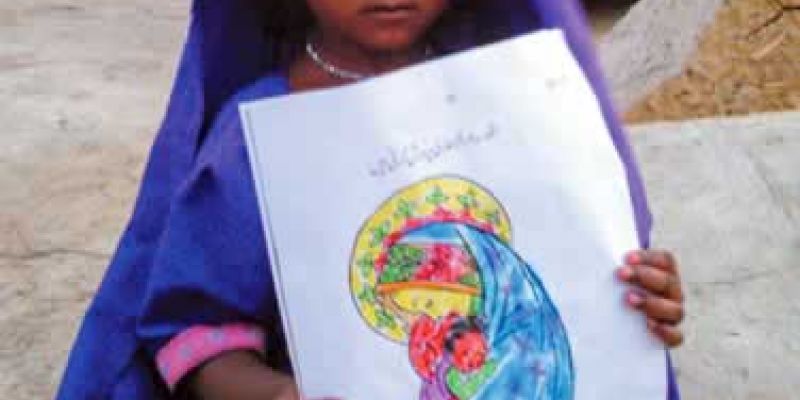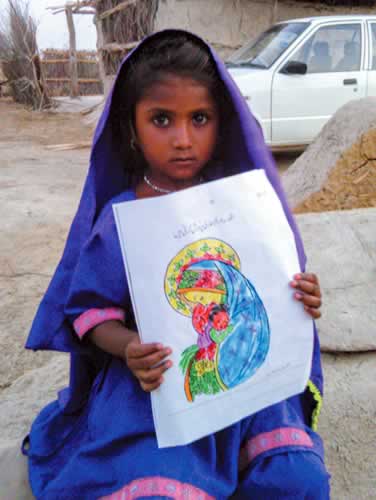
No Education for Poor Children
My name is Louis Ybanez, and I am a Columban seminarian from the Philippines. As a part of my formation to be a missionary priest, I have been assigned for a two year hands-on experience to the Columban parish at the town of Matli, in the arid Sindh province in the south of Pakistan.
Most of our work at the Matli parish is with families living in a type of modern day slavery. The majority of our parishioners are bonded laborers, which means they owe debts of money to wealthy landlords for whom they work and who treat these people as their personal property. These parishioners are members of the Parkari Kohli ethnic community, a small, impoverished minority tribal group. They live in small villages of two or three families in homes made of mud. The land they live on is owned by the landlords.

Our chief pastoral work here in the parish at Matli is to go out to visit the Parkari Kohli villages. Most villages are about one hour’s drive from the parish in the middle of vast farmlands. We usually leave the parish house around four in the afternoon and return to the parish late at night, depending on the distance travelled. A visit means sitting for at least an hour or more talking with the local people. It means trying to get to know them and to know about their daily lives. We then share a meal with the villagers and this is followed by the celebration of the Eucharist.
Keeping up the connection with our Parkari Kohli Catholics is very important. That is why these visits are so important. I have been out visiting villages most days over the last month since being assigned here and have never visited the same village twice.
Our visits to the villages helps remind these bonded laborers of God’s love and care for them and their dignity as beloved children of God. At the same time, because of the extreme poverty and malnutrition of our parishioners and their neighbors that we encounter on these visits, it allows us to offer much needed health care where possible.
As we arrive at a village, we are met with the typical greeting of welcome, “Isu ni jee,” which means “Long live Jesus.” We are then led to sit on a string bed called a charpai, which is set outside the homes. The bed is covered by a colouful cloth called a rali which reflects the great craftsmanship of the Parkari Kohli people. The different ways by which they combine colors and the geometric patterns interests me. It is truly a work of art that they should take pride in.
During the ensuing conversation, a hot chai tea is served. Large numbers of children usually gather around the conversation of the adults. With their parent’s permission, I usually bring coloring books with stories from the Bible for the children to color. As there are no tables or chairs, the children sit quietly on the dry mud floors as they color in the images in the books. They love this activity. Very few of these children, especially the girls, have the opportunity to go to school. The few schools are very far away from these villages.
It is amazing, but it is always the very first time in their lives for these children to use colored pencils or crayons! As these children, like their parents, are almost always illiterate, coloring brings great joy to them. It fascinates them. The children’s imaginations are stimulated by the use of color, and it helps them grow in their faith. During the celebration of the Eucharist, the Catechists use the children’s newly colored-in pictures to deepen their understanding of our faith.
Each time I leave a village I usually feel a little sad. Something as simple as crayons and coloring pencils means so much to children who never go to school, never see a book, and never learn to read, write and count. I wonder when I will be back and hope for another chance to reach out to these families in their poverty, discrimination and oppressed conditions.
This arid area is watered by irrigation canals that make agriculture here possible. As I travel around this area, crossing these canals, I have come to think that these canals are a fitting allegory for our visits to the villages. Our pastoral visits are indispensable because it is like the water that gives the Parkari Kohli people an opportunity to grow in their faith and trust in God. It also makes the Church more aware of the ongoing plight of the Parkari Kohli against a life of slavery, oppression and the terrible injustices they suffer. As a parish we reach out to bring the Gospel of hope and liberation to our parishioners.
Originally from the Philippines, Columban seminarian Louis Ybanez is in Pakistan on his first missionary assignment.


 The Columbans are a society of missionaries, including priests and lay people, who minister to people of various cultures as a way of witnessing to the universal love of God.
The Columbans are a society of missionaries, including priests and lay people, who minister to people of various cultures as a way of witnessing to the universal love of God.